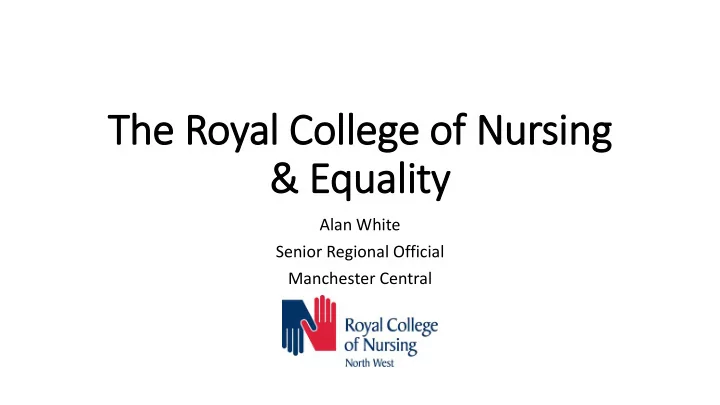

The Royal College of Nursing & Equality Alan White Senior Regional Official Manchester Central
What is the Royal College of Nursing (R (RCN)? • Began as the College of Nursing in 1916 receiving the Royal charter in 1928. • The Worlds largest Nursing Trade Union & professional body • We support nurses, midwives, students, HCSW’s, HCA’s. Nurse Associates, Assistant Practitioners and more • Over 435,000 members and growing
The RCN & Equality • At present the nursing workforce in the UK has a deficit of over 40,000 nurses • Historically nurses have always come from overseas to work in the UK. This was particularly evident during the Wind Rush from approximately 1948 to 1972. • Over the years more and more nurses have been recruited to the NHS and independent sectors from the Caribbean, Africa, the Philippines, India and eastern Europe. • As such the RCN has developed into an organisation that recruits it’s members from all over the globe.
What does the RCN do? • Provides professional support and employment relations support within the work place for various reasons • Grievances • Disciplinary hearings • Capability concerns • Sickness & absence & more • All of the above utilise local policies and legislation
What legislation? • Employment Rights Act 1996 • Employment Relations Act 1999 • Equality Act 2010
Workforce Race Equality Standard • The NHS Equality and Diversity Council announced on 31 July 2014 that it had agreed action to ensure employees from black and minority ethnic (BME) backgrounds have equal access to career opportunities and receive fair treatment in the workplace. • This is important because studies shows that a motivated, included and valued workforce helps deliver high quality patient care, increased patient satisfaction and better patient safety. • HS providers are expected to show progress against a number of indicators of workforce equality, including a specific indicator to address the low numbers of BME board members across the organisation.
Workforce Race Equality Standard (cont) • The first phase of the WRES focused on supporting the system to understand the nature of the challenge of workforce race equality and for leaders to recognise that it was their responsibility to help make the necessary changes. • The next phase of the WRES will focus on enabling people to work comfortably with race equality. Through communications and engagement, the NHS will work to change the deep rooted cultures of race inequality in the system, learn more about the importance of equity, to build capacity and capability to work with race.
What the RCN learnt fr from WRES? • Concerns about the over-representation of BAME staff in disciplinary cases at work. • Potential discrimination and cultural bias in disciplinary proceedings against BAME staff. • BAME staff were up to 50 per cent more likely to be the subject of formal investigations, more likely for investigations to proceed to formal hearings, and more likely to be given sanctions as a result. • Whilst there was no way of unequivocally proving why this pattern had emerged, it’s believed that the underlying reason for these differences lies primarily in unconscious bias and discrimination amongst decision makers.
What did the RCN do? • The RCN launched the Cultural Ambassador Programme (CAP). • This was conceived by the former RCN West Midlands Regional Director, Paul Vaughan in light of the evidence seen in WRES at a local Trust. • The programme was a response to UK-wide research evidence, corroborated by anecdotal concerns and responses to Freedom of Information requests in the West Midlands, showing that a disproportionately high number of BME staff in the NHS are subject to formal disciplinary and investigation processes.
How does it work? • Cultural ambassadors are trained by the RCN with local Trust to identify and challenge discrimination and cultural bias. They use these skills in their role as a neutral observer within disciplinary processes, formal investigations and grievance hearings involving staff from BAME backgrounds. • CA’s are volunteers already employed by a Trust and usually come from a BAME background. They can be from any role within the Trust from porters, kitchen staff, nurses etc.
How does it work (cont) • The voluntary cultural ambassador role acts in a completely different way to those on the investigating teams and disciplinary or grievance panels. Cultural ambassadors are there to look at these formal processes through a different lens and provide independent advice and guidance • Panels are usually thinking about policies and procedures and what is considered ‘right’ and ‘wrong’ but that can limit the way of looking at things.
What does the CA do? • Examines the evidence, It is important to hear all the facts from the beginning. In some cases where there hasn’t been a sanction given it’s because the CA has teased everything out before it got to a hearing and realised it was misinterpretation or miscommunication, or the level of accusation was wrong. • Supports, Some people feel better supported when there’s someone there whose purpose it is to make sure they’re fairly treated. There can be a lot of stigma and some employees from a BAME background may automatically feel they’ll be treated in a certain way.
Has it had an impact? • Yes, “The pilot Trust reported an increase in requests from trade unions and staff for a Cultural Ambassador to be assigned to disciplinary panels, indicating that BAME staff members have more confidence in the process when a Cultural Ambassador is present.” • The Cultural Ambassador programme is now fully embedded into the pilot Trusts employee relations process and is administered by its employee relations team. • The Trust reported a reduction in proceedings against staff from BAME backgrounds • It has since been rolled out across England and will be running in at least one trust in every region by the end of 2020.
• Any questions?
Recommend
More recommend